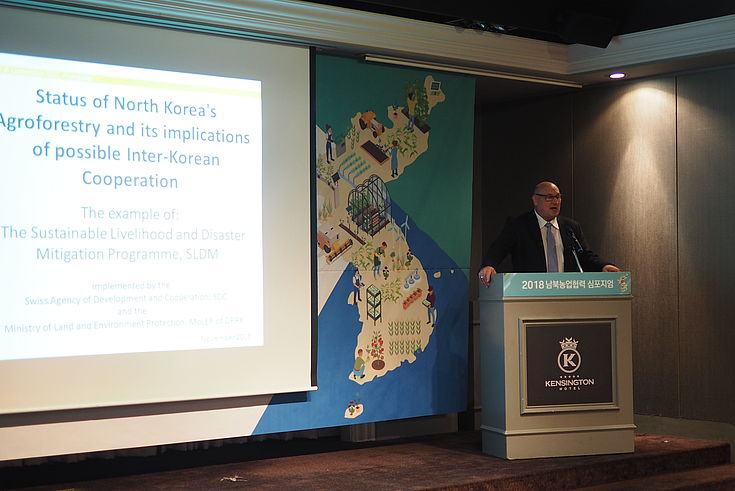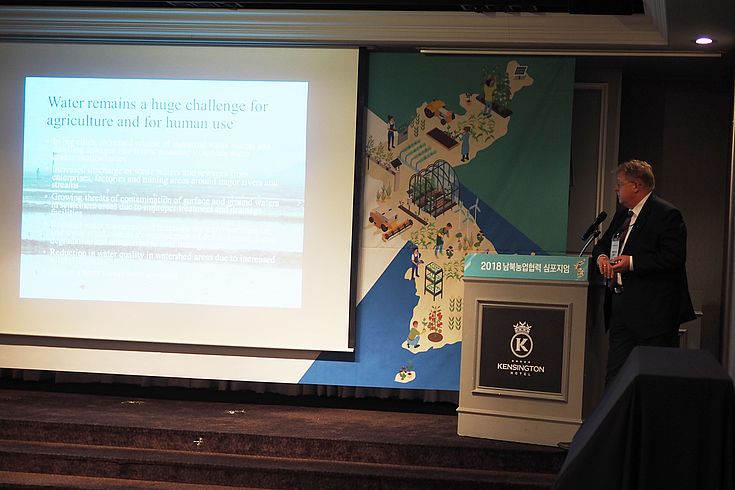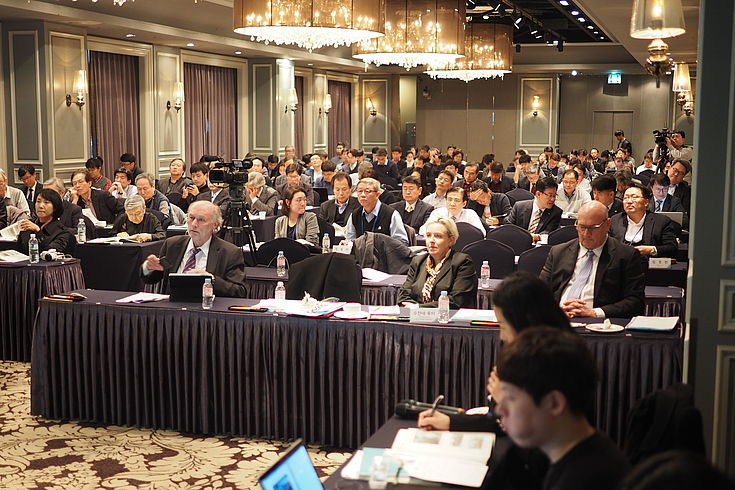International Conference
South-North Korean Agriculture Cooperation
Thomas Fisler (former representative of the Swiss Agency for Development and Cooperation (SDC) in Pyongyang) introducing the SLDM Programme
HSS
Thomas Fisler, former representative of the Swiss Agency for Development and Cooperation (SDC) in Pyongyang, presented the Sustainable Livelihood and Disaster Mitigation Programme (SLDM). The programme was implemented from 2004 by the SDC and the Ministry of Land and Environment (MoLEP) of the DPRK with the aim of helping communities to achieve greater food security and better protection against natural disasters through agroforestry. Agroforestry in the DPRK means combining traditional agricultural practices on sloping lands with forest protection, protecting the environment and at the same time meeting demands on agricultural and forestry products. Through this programme, communities have been better able to protect their life-sustaining resources and the risks of floods, droughts and plant pests have been reduced. In addition, communities learned how to grow, harvest and market a balanced variety of nutritionally relevant plants and trees. The DPRK places particular emphasis on cooperation and technical exchange with international cooperation organisations, which also enables cooperation between South and North Korea.
Dr. Bernhard Seliger (representative of the HSF Korea) explaining the current state of agriculture in the DPRK
HSS
Insights into the general current state of agriculture in the DPRK were provided by Dr. Bernhard Seliger, representative of HSF Korea. Among other things, he mentioned that the preparation for natural disasters in North Korea is still a problem, but has also improved considerably in recent years. Another central topic was water management - the DPRK is facing some problems with water pollution, which also threatens to contaminate surface and groundwater in settlement areas. These problems are partly caused by deforestation and unsustainable land management, leading to insufficient preparedness for natural disasters, which in turn leads to more contamination problems. There is, moreover, a greater official interest in the mechanisation of agriculture and in increased livestock farming.
Willi Lange (Head of the Institute for Northeast and Central Asia, HSF), Dr. Susanne Luther (Head of the Institute for International Cooperation, HSF) and Thomas Fisler (former representative of the Swiss Agency for Development and Cooperation in Pyongyang) with the audience in the background
HSS
Dr. Lee Hae-Jeong of the Hyundai Research Institute suggested ways to combine North Korean Economic Development Areas with the South Korean idea of Unified Special Districts. She proposed to create a new model based on the combination of the two current models and the experience of economic cooperation in this process. She also felt that the success of the Economic Development Districts in the DPRK required a forward-looking and open policy and the efforts of neighbouring countries to promote it. Another issue that was addressed intensively was North Korea's agricultural infrastructure. Prof. Lim Jeong-Bin of Seoul National University suggested setting up various "belts" for product exchange and economic cooperation on the Korean peninsula. In order to realise this idea, it is important to implement several South-North Korean cooperation projects in the agricultural sector, which would also help to alleviate the problems of food shortages in North Korea. Dr. Kim Gwan-Ho of the Rural Research Institute agreed with this view while stressing the importance of enhanced cooperation through the development of private-public partnerships (PPPs).



